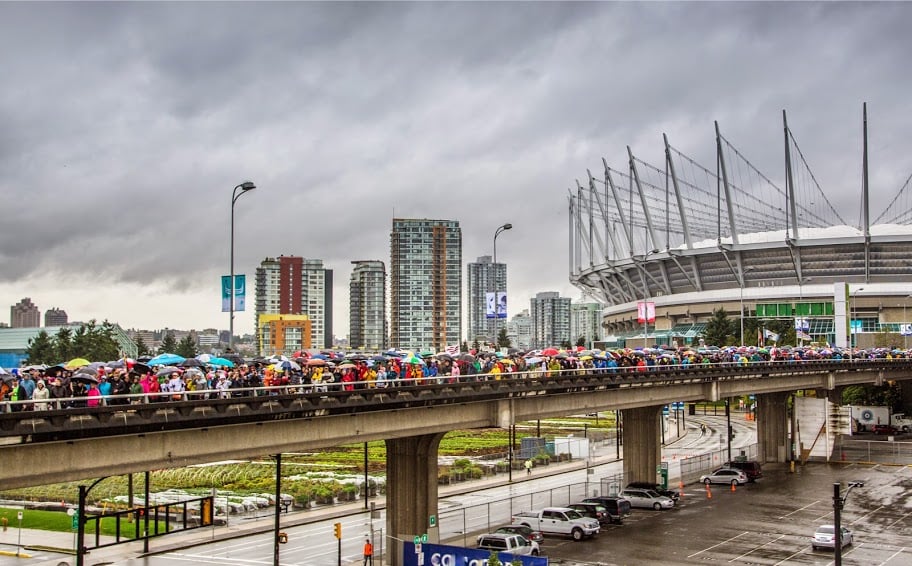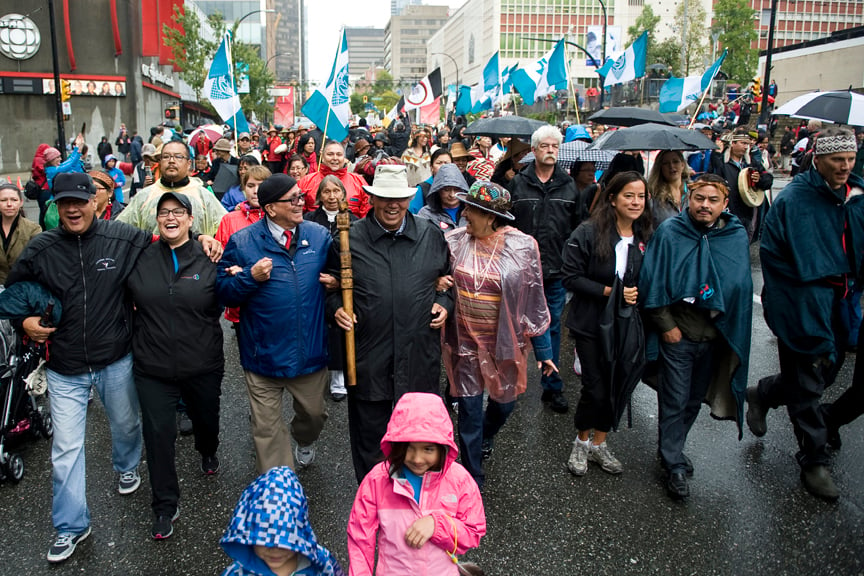“It remained a dark secret for a long, long time,” said Chief Robert Joseph.
Joseph is a residential school survivor. He was taken from his family and entered into St. Michael’s in Alert Bay at age six. He endured 11 years of emotional, sexual and physical abuse, from being strapped “buck naked” to being dragged by the ear, which severely damaged his hearing.
“I was so ashamed to talk about it,” Joseph said.
But then came the Truth and Reconciliation Commission (TRC) in 2008, and the dark Canadian history that Joseph experienced began to come to light.
A 2015 poll by Angus Reid also gave Joseph optimism. The poll found that 7 in 10 Canadians agreed with the TRC’s characterization of residential schools as “cultural genocide.”
“For me, that really was healing,” he said. “It brought some peace to me that Canadians do care.”
Joseph recognized the importance of creating opportunities for Canadians to talk about Indigenous issues. He founded Reconciliation Canada in 2012 to keep the conversation going and to make and strengthen relationships between Indigenous and non-Indigenous people.
In 2013, Reconciliation Canada and a number of partners hosted a Walk for Reconciliation in Vancouver that drew 70,000 participants despite the rain. There were a number of public speeches, including one by Dr. Bernice King, daughter of Martin Luther King Jr.
“Believe it or not,” King told the crowd, “you have made a big step towards progress here in Canada.”
Reconciliation Canada, in collaboration with Canada 150+ and other partners, is organizing another Walk for Reconciliation this month. It will take place in Vancouver on Sept. 24 at 9:30 a.m. and is followed by a Reconciliation Expo (details available in the sidebar).
The walk will begin at Cambie and Georgia and end at Strathcona Park, which will host the Reconciliation Expo.
One business that’s collaborating with Reconciliation Canada is cosmetics company Lush. The Walk for Reconciliation is being promoted in their stores, and 250 store managers in North America will be coming to Vancouver for the walk.
“We’re in the beginning stages of talking about reconciliation as a business,” said Carleen Pickard, Lush’s ethical campaigns specialist.
Since connecting with Reconciliation Canada, Lush has educated their Canadian staff on colonization, the residential school system and intergenerational trauma.
“We really feel the momentum has been building over the last four years,” said Charlene Seward, Reconciliation Canada’s community engagement manager. “More people are aware of what reconciliation means and want to get involved.”

‘You’re all a part of this’
Chief Joseph, 78 this month, is at the forefront of the reconciliation efforts in Canada, but it took a long time for him to reconcile with the pain he experienced in his past.
Joseph became a heavy drinker after leaving residential school. It hurt his family life, and his wife and five children eventually left him.
Then one day, he ran into a friend in downtown Campbell River.
“I don’t like what you’re doing to yourself,” said the friend, Joseph recalls. “Let’s go fishing.”
It was an overnight trip. Joseph remembers waking up the next day unsure of where he was until he went outside to sit at the back of the boat.
“I saw the ocean on the other side of the channel,” said Joseph. “I saw the Vancouver Island forest, and it had lightning bolts going through it. Pretty soon, my gaze went right up to the celestial level. I heard a voice say to me, ‘In spite of what you’ve done to yourself, I love you, and you’re a part of all this.’”
It was exactly the words Joseph needed to hear.
But the healing took longer to happen. Joseph did international reconciliation work with the Interreligious and International Federation for World Peace that took him to places like South Africa, Israel, South Korea and Mongolia.
“When you left the residential school, you never felt like you were a decent person, so I did service work,” said Joseph. “Reconciliation really starts internally.”
He later helped word the apology given to First Nations for Canada’s residential school system delivered in 2008 by former prime minister Stephen Harper. He was also an advisor to the Truth and Reconciliation Commission and to Indian Residential School Resolutions Canada.
Joseph says all Canadians have an important role to play in reconciliation. Some of his suggestions for how to get started: reach out to your local indigenous community to start a dialogue or, very simply, just read as much as you can.
Racism and stereotypes are reconciliation’s biggest roadblocks, said Joseph, but they can be combatted by becoming educated and meeting Indigenous people.
“It’s all about learning and listening,” he said. ![]()
Read more: Indigenous
This article is part of a Tyee Presents initiative. Tyee Presents is the special sponsored content section within The Tyee where we highlight contests, events and other initiatives that are either put on by us or by our select partners. The Tyee does not and cannot vouch for or endorse products advertised on The Tyee. We choose our partners carefully and consciously, to fit with The Tyee’s reputation as B.C.’s Home for News, Culture and Solutions. Learn more about Tyee Presents here.
















Tyee Commenting Guidelines
Comments that violate guidelines risk being deleted, and violations may result in a temporary or permanent user ban. Maintain the spirit of good conversation to stay in the discussion.
*Please note The Tyee is not a forum for spreading misinformation about COVID-19, denying its existence or minimizing its risk to public health.
Do:
Do not: